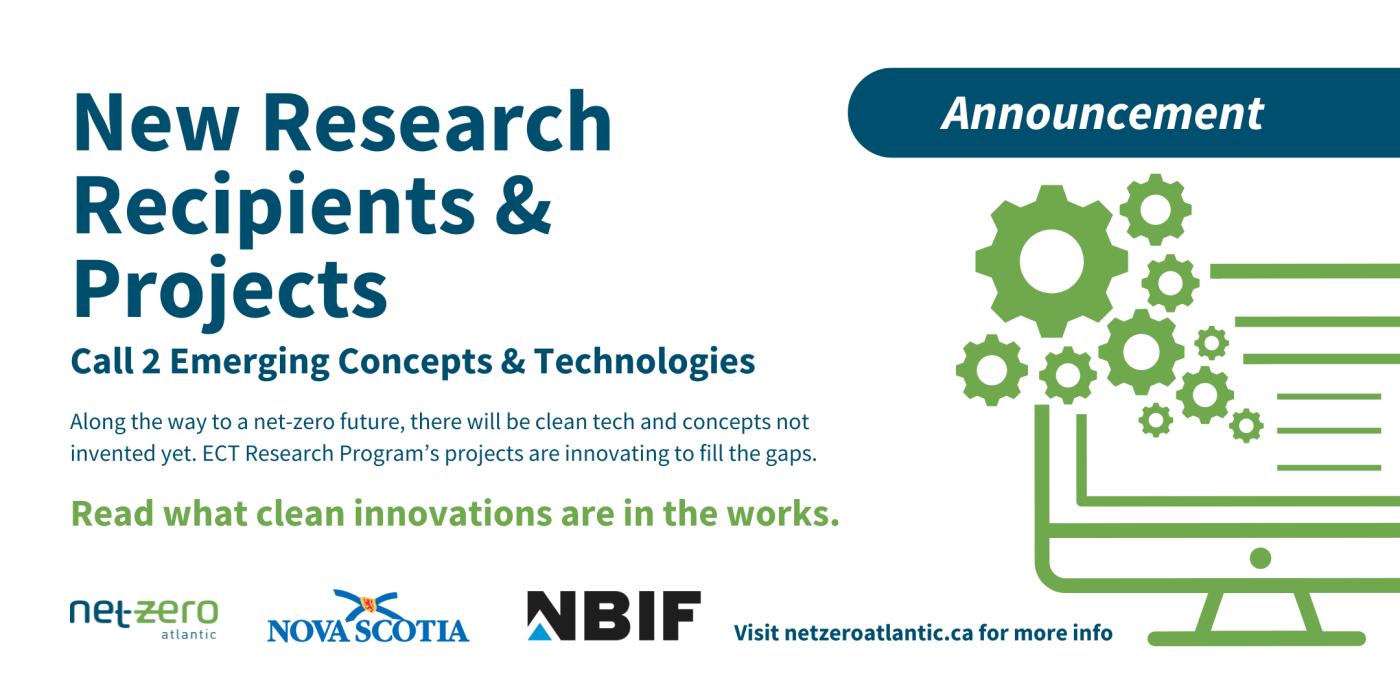Net Zero Atlantic Announces Latest Recipients of Emerging Concept and Technologies Research Program
Atlantic Canada, April 30, 2024 – Net Zero Atlantic’s Emerging Concept and Technologies (ECT) Research Program has taken another large-sized step along Atlantic Canada’s pathways to a net-zero future. The recent call has added 13 projects to the ECT program (nine within Nova Scotia and four in New Brunswick), which brings the total to 26 clean technology innovations for call 1 and 2.
“Scientists, engineers, and backyard inventors were invited to provide solutions to reduce greenhouse gas emissions required to achieve net-zero by 2050,” says Tim Bachiu, a director of research for Net Zero Atlantic. “Specifically, their challenge was to identify gaps in carbon-reduction pathways for hard-to-abate emissions. The result is a coordinated acceleration of momentum in finding highly practical clean tech solutions that have the potential to be locally applicable.”
Projects in the ECT program are in various stages of development, from invention to testing to scaling up for market, and the problems the research teams are addressing are wide-ranging as well.
“We formed a project review committee to join us in identifying the technological needs of today then issued the call for submissions,” says Molly Noseworthy, ECT Project Manager at Net Zero Atlantic. “The response was exciting. Now in development are projects addressing immediate needs, from long-term energy storage to nature-based solutions for carbon sequestration.”
Along with projects addressing storage and carbon, there are other difficult challenges being researched, including agricultural emissions, fishing and ferry fleets, direct air capture, and electricity system challenges post-2030.
A full list of projects and recipients is displayed under the research and projects on the Net Zero Atlantic website. Funding for the ECT program at Net Zero Atlantic is provided in part by Nova Scotia Department of Environment and Climate Change and the New Brunswick Innovation Foundation.
“Increased momentum in finding practical solutions is at the core of bringing us into a net-zero future,” says Tim Bachiu, Director of Research for Net Zero Atlantic. “Our ECT program is addressing localized technological gaps. We look forward to sharing the results.”
For more information about the Emerging Concepts and Technology Research Program and other Net Zero Atlantic activities, visit netzeroatlantic.ca.
ECT Research Program Call 2 Projects
New Brunswick-based Projects
Internet of Things-Driven Modeling System for Monitoring Greenhouse Gas Emissions in the Canadian Agriculture Sector
Priority research theme: Agricultural Emissions
Lead researcher and organization: Zunaira Asif, University of New Brunswick - Saint John
Developing a toolset to evaluate carbon sequestration in New Brunswick mudflats
Priority research theme: Nature-based Solutions for Carbon Sequestration
Lead researcher and organization: Myriam Barbeau, University of New Brunswick
Development of a methodology for accounting for carbon stocks in New Brunswick wetlands
Priority research theme: Nature-based Solutions for Carbon Sequestration
Lead researcher and organization: Dodick Gasser, Le CCNB-INNOV
Towards a Net Zero and Resilient New Brunswick Grid via Vehicle to X Technology
Priority research theme: Power challenges post 2030
Lead researcher and organization: Saxena Shivam, University of New Brunswick
Nova Scotia-based Projects
Photocatalyts for sunlight driven simultaneous hydrogen generation and plastic degradation
Priority research theme: Hydrogen as an Alternate Fuel Source
Lead researcher and organization: Mita Dasog, Dalhousie University
Sustainable Hydrogen Generation Using Novel Heterogeneous Nanocomposites
Priority research theme: Hydrogen as an Alternate Fuel Source
Lead researcher and organization: Geniece Hallet-Tapley, St. Francis Xavier University
Advancement of Net-Zero Marine Technologies: Development of Long-lifetime Battery Prototype with Vessel-to-Grid (V2G) Functionality for Electric Marine Transportation in Nova Scotia and Atlantic Canada
Priority research theme: Decarbonization of Fishing and Ferry Fleets
Lead researcher and organization: Ravindra Kempaiah, Zen Energy
Developing a C-budget model for balsam fir Christmas tree orchards and enhancing carbon drawdown
Priority research theme: Nature-based Solutions for Carbon Sequestration
Lead researcher and organization: Mason MacDonald, Faculty of Agriculture, Dalhousie University
Piloting Acuicy Software to Incentivize Decarbonization of Agriculture Supply Chains in Nova Scotia
Priority research theme: Agricultural Emissions
Lead researcher and organization: Allison Murray, Acuicy Inc.
Design and Construction of a Prototype micro-Combined Heat and Power Unit operating on an organic Rankine cycle fueled with Hydrogen Enriched Natural Gas up to 100 % Hydrogen
Priority research theme: Hydrogen as an Alternate Fuel
Lead researcher and organization: Michael Pegg, Dalhousie University
A.I.-Driven Benchmarking Tool for Emission Reduction in Canadian Dairy Farms
Priority research theme: Agricultural Emissions
Lead researcher and organization: Suresh Raja Neethirajan, Dalhousie University
Quantifying Emissions Reductions in Ships with Crowdsourced Weather Routing
Priority research theme: Decarbonization of Fishing and Ferry Fleets
Lead researcher and organization: Craig Summers, SailTimer Inc.
Novel high-performance opto-chromic sensing technology for visible detection of hydrogen leaks in pipelines and storage
Priority research theme: Hydrogen as an Alternate Fuel Source
Lead researcher and organization: Alison Thompson, Dalhousie University
--30--
About Net Zero Atlantic
Net Zero Atlantic is a leading energy research organization advancing Atlantic Canada’s transition to a low-carbon future. We are encouraging growth of a sustainable energy sector by identifying knowledge gaps, connecting experts to projects, and leading applied research. Our work covers critical areas in need of development, such as clean technology, pro-climate behaviour, hydrogen, offshore wind, geothermal energy, and energy system modelling.
Emerging Concepts and Technologies Research Program is identifying gaps in carbon-reduction pathways for hard-to-abate emissions and to support province-specific solutions to reduce greenhouse gas emissions required to achieve net-zero by 2050. The program adapts and expands with recurring open calls for research and development projects. There have been two calls to date with call 3 being released in the summer of 2024.
Media contact:
Kasia Morrison
Communications and Engagement Lead
Net Zero Atlantic
902-410-6325
kmorrison@netzeroatlantic.ca

